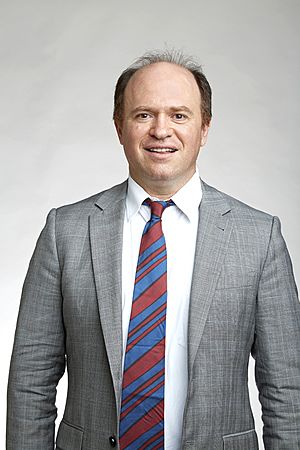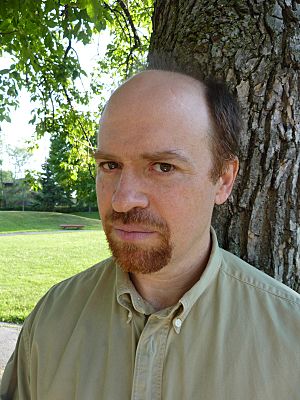Daniel Wise (mathematician) facts for kids
Quick facts for kids
Daniel Wise
FRS FRSC
|
|
|---|---|

Wise in 2018
|
|
| Born |
Daniel T. Wise
January 24, 1971 |
| Alma mater | Princeton University (PhD) |
| Awards | CRM-Fields-PIMS prize |
| Scientific career | |
| Thesis | Non-positively curved squared complexes, aperiodic tilings, and non-residually finite groups (1996) |
| Doctoral advisor | Martin Bridson |
Daniel T. Wise was born on January 24, 1971. He is an American mathematician who studies interesting shapes and groups in mathematics. He teaches math at McGill University. A special idea in math, called Wise's conjecture, is named after him.
Learning and Early Work
Daniel Wise went to Princeton University for his advanced studies. He earned his PhD, which is a high-level degree, in 1996. His teacher there was Martin Bridson.
Math Research and Discoveries
Professor Wise's work focuses on how certain shapes, called "cube complexes," help us understand different groups in mathematics. His early research explored these ideas in more complex ways.
In 2009, he shared an important discovery about "3-manifolds." These are like 3D shapes that mathematicians study. His work helped solve a big puzzle called the virtually fibered conjecture. This discovery also showed how cube complexes can help us understand many different kinds of infinite groups. His ideas were very important for proving another major math puzzle, the Virtually Haken conjecture.
Awards and Special Honors
Daniel Wise has received many important awards for his work in mathematics.
- In 2013, he and Ian Agol won the Oswald Veblen Prize in Geometry. They earned this for their work on special cube complexes.
- In 2014, he was chosen as a Fellow of the Royal Society of Canada (FRSC). This is a high honor for Canadian scientists.
- In 2016, he received the Jeffery–Williams Prize and the CRM-Fields-PIMS Prize. He also won a Guggenheim Fellowship, which helps scientists do more research.
- In 2018, he became a Fellow of the Royal Society (FRS). This is a very old and respected group of scientists in the United Kingdom.
- In 2019, he was awarded the Lobachevsky Prize. This award recognized his important contributions to the virtual Haken conjecture.
 | Emma Amos |
 | Edward Mitchell Bannister |
 | Larry D. Alexander |
 | Ernie Barnes |


